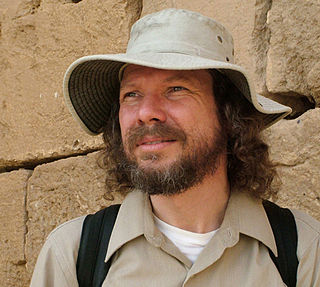A Quote by Robert M. Schoch
Well-referenced, with numerous quotations from renowned Egyptologists and classical scholars, Acharya's penetrating research clearly lays out the very ancient pre-Christian basis of modern Christianity. Those who espouse Christianity beware! After digesting the evidence, you will never again view your religion in the same light.
Related Quotes
My spiritual path has largely been Christianity - a label that I embraced and then rejected and have partially embraced again, as my understanding of Christianity has changed over time. When I accepted the mainstream, dogmatic definition of Christianity there came a point when I had to say, "Well, if that's what a Christian is, I'm not one."
Christian scholars often say that Sufi theories are close to those of Christianity. Many Moslems maintain that they are essentially derived from Islam. The resemblance of many Sufi ideas to those of several religious and esoteric systems are sometimes taken as evidence of derivation. The Islamic interpretation is that religion is of one origin, differences being due to local or historical causes.
There is a quality of lightness, easiness, and in some sense blatant unseriousness that pervades Classical Christianity's dialogue with modernity. The Christian intellect has no reason to be intimidated in the presense of later-stage modernity. Christianity has seen too many 'modern eras' to be cowed by this one.
The way in which I know Christianity is true is first and foremost is the basis of the witness of the Holy Spirit in my heart. And this gives me self-authenticating means of knowing Christianity is true wholly apart from the evidence. And therefore, even if in some historically contingent circumstances the evidence that I have available to me should turn against Christianity, I do not think that controverts the witness of the Holy Spirit.
Christianity is not a religion. Christianity is the proclamation of the end of religion, not of a new religion, or even of the best of all religions. If the cross is the sign of anything, it's the sign that God has gone out of the religion business and solved all of the world's problems without requiring a single human being to do a single religious thing. What the cross is actually a sign of is the fact that religion can't do a thing about the world's problems - that it never did work and it never will
As for Christianity's alleged concern with truth, Christian faith is to free inquiry what the Mafia is to free enterprise. Christianity may be represented as a competitor in the realm of ideas to be considered on the basis of its merits, but this is mere disguise. Like the Mafia, if Christianity fails to defeat its competition by legitimate means (which is a forgone conclusion), it resorts to strong-arm tactics. Have faith or be damned - this biblical doctrine alone is enough to exclude Christianity from the domain of reason.
Christians have always tended to transform the Christian Revelation into a Christian religion. Christianity is said to be a religion like any other or, conversely, some Christians try to show that it is a better religion than the others. People attempt to take possession of God. Theology claims to explain everything, including the being of God. People tend to transform Christianity into a religion because the Christian faith obviously places people in an extremely uncomfortable position that of freedom guided only by love and all in the context of God's radical demand that we be holy.
This Christianity is not a cultural thing. It is not something that should be just a small part of your life; it is not something that you do on Sunday... Christianity is not about you being just like the world all the time and then coming to church on Sunday. If that is your Christianity... you are not Christian.
The vestiges of pagan religion in Christian symbology are undeniable. Egyptian sun disks became the halos ... The pre-Christian God Mithras ... had his birthday celebrated on December 25 ... Even Christianity's weekly holy day was stolen from the pagans ... Christianity honored the Jewish Sabbath of Saturday, but Constantine shifted it to coincide with the pagans' veneration of the day of the sun ... To this day, most churchgoers attend services on Sunday morning with no idea that they are there on account of the pagan sun god's weekly tribute- Sunday.
The sum of the whole matter is this: He who is one in will and heart with God is a Christian. He who loves God is one in will and heart with Him. He who trusts Christ loves God. That is Christianity in its ultimate purpose and result. That is Christianity in its means and working forces. That is Christianity in its starting point and foundation.
We do injury to a child if we bring it up in a narrow Christianity, which prevents it from ever becoming capable of perceiving that there are treasures of purest gold to be found in non-Christian civilizations. Laical education does an even greater injury to children. It covers up those treasures, and those of Christianity as well.
































